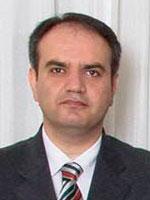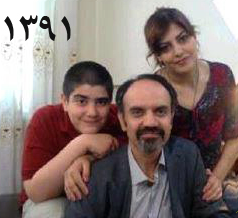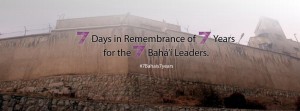Vahid is Vahid Tizfahm, yet another widely known and cherished community servant taken from among the Iranian Baha’is. He and his partners in “crime” are the focus for the international #7Bahais7Years campaign, and here we go again. Danny and Pej asked their buddy, me, to contribute to the social media protests, and I’m hoping these personal essays are of some use in the necessary worldwide conversation. Vahid Tizfahm and his six colleagues are sacrificial lions, bravely enduring pariah status in a country that needs their kind more than it knows. Here is the last instalment of my series on the Quietly Magnificent Seven, prisoners of conscience in Iran for seven years, and counting…
At 42, Mr. Tizfahm is the same age as his father was when he was executed for being a Baha’i. Three bullets, no lawyer, no charge that we would recognize as remotely judicial. Vahid, the son who is now the similarly arrested father, is quite the youngest of the Yaran, the “friends”, the group of seven Baha’is that worked to guide and encourage the members of their persecuted community. As has become the disgusting norm in Iranian society, it goes without saying — so I’ll SAY it, again — that he did not go to university; as a member of “this detestable sect”, he wasn’t allowed to. He was able to train as an optometrist, and alongside this business he was a youth leader, taught children’s classes and was appointed to generally inspire, encourage, and promote learning among Baha’is. He studied under and supported the BIHE, the Baha’i Institute for Higher Education, an underground university that trains excluded Baha’i students in living rooms and by email. He did these things, of course, until he and the other Yaran were arrested, for “crimes” such as these, a little more than seven years ago.
***
Vahid is the Persian form of an Arabic word that means “unique”, “peerless”. Vahid. One of the greatest figures of the violently visionary and just plain violent early years of the Baha’i movement, in 19th-century Persia, was given this lofty title. And now we have another singular man, quietly, hardily, heartily bearing societal rejection and punishment in the name of principle, in the pursuit of justice.
Vahid Tizfahm’s son was in grade 3 when they came for him, about the same age his daddy had been when his own father was taken. The family had just moved to Tehran, and my thinly educated guess is that they had done so in order for Mr. Tizfahm to more easily work together with his Baha’i leadership colleagues. (You know, relocation to pursue sacrificial voluntarism, that old story.) The lad is now a sophomore in high school. I have a son about that age, who probably gets more contact with his Dad than he’d like. But what about young Mr. Tizfahm? How much does he miss his unjustly jailed father? What does he think of him? What do his friends think? Does he wonder about his future studies? I was a high school teacher for a long time. I’ve been a Dad for decades. I can’t get over these details in the lives of these seven leaders, and of their children and grandchildren.
In the Baha’i community, sons and daughters in their mid-teens are called to make an independent decision about their faith, since to “see with your own eyes and not through the eyes of others” is an article of faith. In Iran, this assumption of spiritual responsibility carries with it an added onus: one who chooses to follow the Baha’i teachings as a young adult knows that this prevents acceptance by any Iranian university. But hey, no pressure, guys! With this in mind, I’ve re-read Vahid Tizfahm’s letter to his son from prison a little over a year ago. It’s awesome: frank, loving, defiant.
What else is there to say about the imprisonment of these seven paragons of the public good, this ongoing mockery of human rights principles and of the responsibilities of a just government? Iranian authorities have been heard to blandly state that Baha’is who don’t want to go to jail should stop behaving criminally. (My blood boils.) They claim that there is no religious discrimination in the Islamic Republic.
The seven arrested Yaran wrote an open letter last year to Mohammad Javad Larijani, the head of the Human Rights division of the Iranian government, who had made just such astounding statements. You should read this letter as well. I’ve never seen anything quite like it, as it remains constantly polite and uninflammatory even as it systematically dismantles any pretence to justice in the way that Iran treats its largest religious minority. It is an elegant, intellectual body blow. It models both courtesy and relentless truth-seeking, and how often do we see that?
There is another letter, again written by Mr. Tizfahm himself, that might be the most powerful of all. It is a general epistle to his fellow citizens and to the world. He wrote it from prison, and the full text does far better than I can to knit together the threads of the situation, the guiding philosophy and the ferociously peaceful actions of the Baha’is of Iran. Among many other eloquent and astonishing and, yes, maybe even peerless declarations is this one:
“Yes, I think differently, I act differently and I see differently. My world is a world of kindness and love. My approach is service to others and my mentality desires the elimination of all forms of prejudice. My aspiration is to create unity among all my compatriots from every ethnicity, group and religion.
“My heart is free of any animosity and my hands – after many years of confinement and unending pain and suffering – continue to be willing to shake the hands of those who accompany me in the reconstruction of my home land and the revival of our beloved Iran.”
There is much more to this letter, so much more to the modern heroism of Mr. Tizfahm and his colleagues. I can’t recommend it highly enough, and can say nothing more than this.



